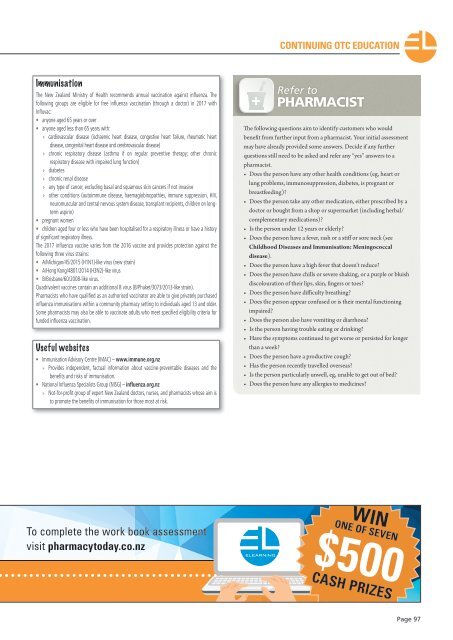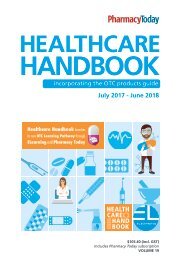2017 HCHB_digital
Create successful ePaper yourself
Turn your PDF publications into a flip-book with our unique Google optimized e-Paper software.
CONTINUING OTC EDUCATION<br />
Immunisation<br />
The New Zealand Ministry of Health recommends annual vaccination against influenza. The<br />
following groups are eligible for free influenza vaccination (through a doctor) in <strong>2017</strong> with<br />
Influvac:<br />
••<br />
anyone aged 65 years or over<br />
••<br />
anyone aged less than 65 years with:<br />
»»<br />
cardiovascular disease (ischaemic heart disease, congestive heart failure, rheumatic heart<br />
disease, congenital heart disease and cerebrovascular disease)<br />
»»<br />
chronic respiratory disease (asthma if on regular preventive therapy; other chronic<br />
respiratory disease with impaired lung function)<br />
»»<br />
diabetes<br />
»»<br />
chronic renal disease<br />
»»<br />
any type of cancer, excluding basal and squamous skin cancers if not invasive<br />
»»<br />
other conditions (autoimmune disease, haemaglo binopathies, immune suppression, HIV,<br />
neuromuscular and central nervous system disease, transplant recipients, children on longterm<br />
aspirin)<br />
••<br />
pregnant women<br />
••<br />
children aged four or less who have been hospitalised for a respiratory illness or have a history<br />
of significant respiratory illness.<br />
The <strong>2017</strong> influenza vaccine varies from the 2016 vaccine and provides protection against the<br />
following three virus strains:<br />
••<br />
A/Michigan/45/2015 (H1N1)-like virus (new strain)<br />
••<br />
A/Hong Kong/4801/2014 (H3N2)-like virus<br />
••<br />
B/Brisbane/60/2008-like virus.<br />
Quadrivalent vaccines contain an additional B virus (B/Phuket/3073/2013-like strain).<br />
Pharmacists who have qualified as an authorised vaccinator are able to give privately purchased<br />
influenza immunisations within a community pharmacy setting to individuals aged 13 and older.<br />
Some pharmacists may also be able to vaccinate adults who meet specified eligibility criteria for<br />
funded influenza vaccination.<br />
Useful websites<br />
••<br />
Immunisation Advisory Centre (IMAC) – www.immune.org.nz<br />
»»<br />
Provides independent, factual information about vaccine-preventable diseases and the<br />
benefits and risks of immunisation.<br />
••<br />
National Influenza Specialists Group (NISG) – influenza.org.nz<br />
»»<br />
Not-for-profit group of expert New Zealand doctors, nurses, and pharmacists whose aim is<br />
to promote the benefits of immunisation for those most at risk.<br />
Refer to<br />
PHARMACIST<br />
The following questions aim to identify customers who would<br />
benefit from further input from a pharmacist. Your initial assessment<br />
may have already provided some answers. Decide if any further<br />
questions still need to be asked and refer any “yes” answers to a<br />
pharmacist.<br />
• Does the person have any other health conditions (eg, heart or<br />
lung problems, immunosuppression, diabetes, is pregnant or<br />
breastfeeding)?<br />
• Does the person take any other medication, either prescribed by a<br />
doctor or bought from a shop or supermarket (including herbal/<br />
complementary medications)?<br />
• Is the person under 12 years or elderly?<br />
• Does the person have a fever, rash or a stiff or sore neck (see<br />
Childhood Diseases and Immunisation: Meningococcal<br />
disease).<br />
• Does the person have a high fever that doesn’t reduce?<br />
• Does the person have chills or severe shaking, or a purple or bluish<br />
discolouration of their lips, skin, fingers or toes?<br />
• Does the person have difficulty breathing?<br />
• Does the person appear confused or is their mental functioning<br />
impaired?<br />
• Does the person also have vomiting or diarrhoea?<br />
• Is the person having trouble eating or drinking?<br />
• Have the symptoms continued to get worse or persisted for longer<br />
than a week?<br />
• Does the person have a productive cough?<br />
• Has the person recently travelled overseas?<br />
• Is the person particularly unwell, eg, unable to get out of bed?<br />
• Does the person have any allergies to medicines?<br />
To complete the work book assessment<br />
visit pharmacytoday.co.nz<br />
WIN<br />
ONE OF SEVEN<br />
$500<br />
CASH PRIZES<br />
Page 97



